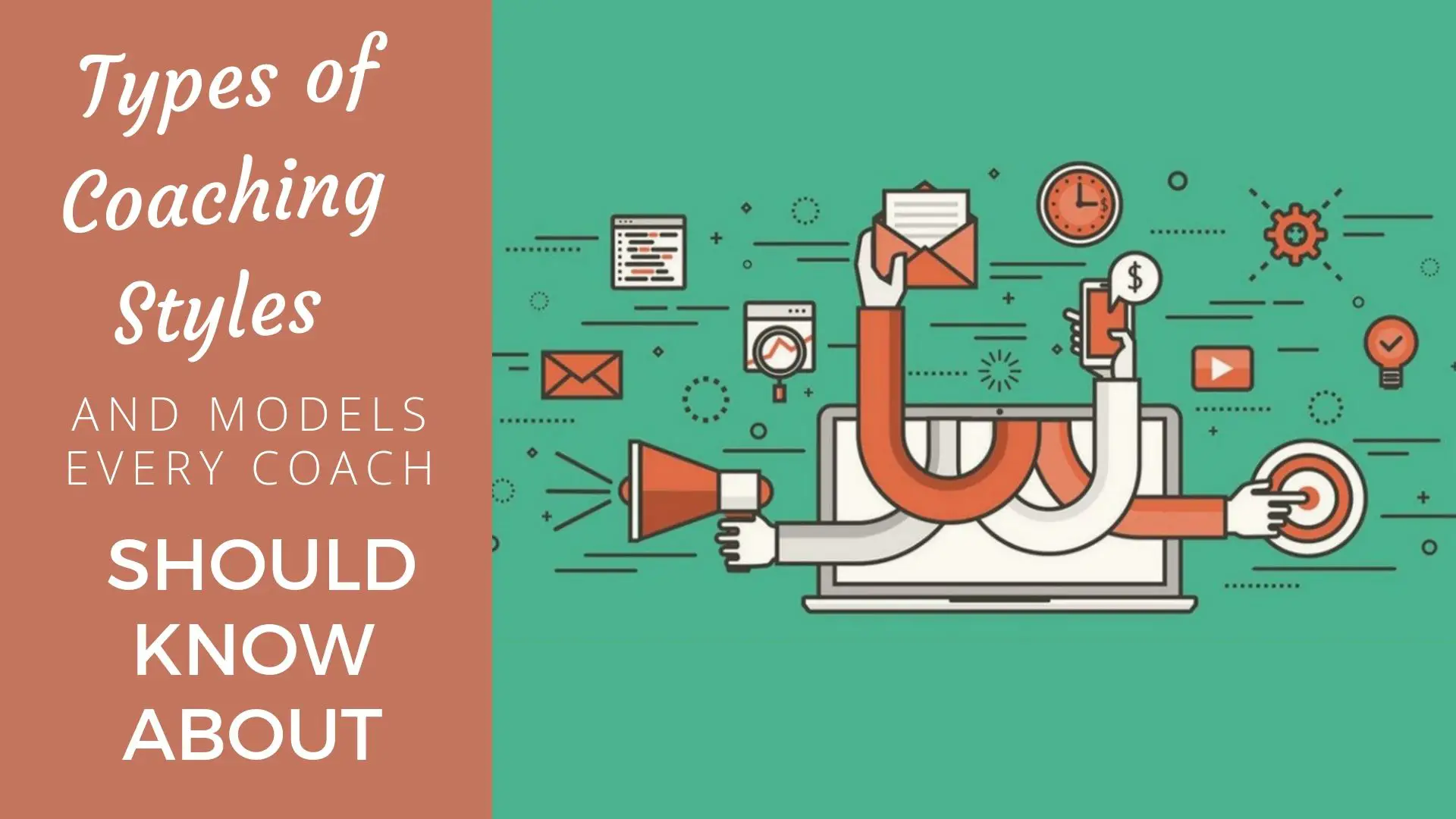All coaches have a certain personal style and coaching model that they follow. This can change the way they affect people considerably, as different people respond to different behavior and management cues. Depending on the needs and goals of your client, you might need to use multiple coaching techniques and coaching styles to reach them in the best manner.
If your client doesn’t respond to a particular coaching model well, you might need to change the way you interact and assist them in their journey.
Here we will talk about the types of coaching techniques and types of coaching styles you can use to help your clients improve their lives.
But first, a few important questions:
What are Coaching Techniques?

The various types of coaching styles are the coaching methods and practices that are used during their sessions to change and influence behavior patterns. These techniques, when used effectively, can help a coach measurably influence a client’s progress.
These techniques are a way for coaches to give clients direct results and displaying tangible growth where it is required. Some clients feel that their sessions are more productive when certain techniques being used.
Mastering these coaching styles that will assist you in your role as a coach will also show your expertise. This helps you project more confidence for your clients, which is good.
The more successful and in control of your own life you are, the more appealing you are as a coach. Who wouldn’t want to take guidance from a person who is themselves very successful and masterful in their craft?
What are Coaching Styles?
Coaching styles are nothing but social approaches and behavior models a coach uses depending on their personal brand and their clients. Having a good grasp of multiple coaching styles makes you a better coach because all clients are different.
Some clients may respond to a more structured approach that places a lot of emphasis on discipline, while others may respond better to a gentler and more fluid approach.
Why do You Need to Master Coaching Styles?

Depending on their growth, sometimes a single client may need you to use different styles, the only way to be a good judge of such needs is by empathizing with your client and thus being flexible in your personal style of managing people. With experience, you can refine that skill to become better at judging the way that people need to be guided.
No matter how effective your type of coaching style is unless you have the correct approach and coaching style for a client, your efforts will not be very effective.
Do I Need Certification in Coaching Styles and Techniques?

No, you do not need to have a certification to practice most coaching techniques and styles, but it helps if you have certain certifications in the relevant fields of studies. For example, having a psychology course certification will give you more knowledge into the human mind, and thus clients can trust that you have a basic threshold of knowledge to understand their experience in the proper context.
Certain coaching techniques based on holistic healing can also be more effective for clients when you have a certification and training to use them correctly. Clients also have more trust in your coaching process when you have taken the time to get trained in your skills.
Skills like emotional freedom techniques (EFT), neuro-linguistic programming (NLP), and hypnotherapy can sometimes be looked at as somewhat shrouded in mystery and thus can have negative associations with certain people. Getting trained in these skills through a holistic skills centre will give you more credibility.
Types of Coaching Techniques
As we said, depending on the needs of your clients, using these coaching techniques can offer your clients a way to tangibly change the scope of their progress and thus feel more empowered in their life.
By involving the client in the process of their own recovery, you can make the client feel more in charge of their direction of growth.
By going through these activities and techniques, you gain more than just the knowledge. You can get a better understanding of their problem areas, and thus build a better trust-based connection with your client.
No technique is one-size-fits-all, so make sure to know your client well and offer a tailor-made experience for them.

Here are some common techniques used by coaches:
Neuro-linguistic Programming (NLP)
Neuro-linguistic programming (NLP) are techniques that you can use to help your clients change their language and behavior techniques. This will allow them to match their habits to that that successful people have, in essence giving them more potential for success.
Emotional Freedom Techniques (EFT)
You can use emotional freedom techniques (EFT) to help your clients dispense extra emotional stresses. You can train in acupuncture techniques to master this process.
Hypnotherapy: You can use classic techniques of hypnotherapy to reach your client more effectively while they are in a deeply relaxed state of being. This lets you plant suggestions that can help your client be more motivated in breaking bad behavioral and cognitive patterns.
Writing exercises: You can use writing exercises as a medium of employing other techniques for clients who are not able to coherently or confidently express themselves enough yet. Sometimes people find it easier to be more honest and clear when writing instead of talking.
This can change the way you help certain clients because it will allow you to gauge their needs more clearly.

Interview Techniques
Effectiveness of these techniques highly depends on the type of client you have. Some clients reveal more in the interview setting while some feel confronted. Get to know your client, and then make an educated decision as to whether they will benefit from your techniques.
Open-ended Questions
Instead of asking questions that have limited scope of answers, try asking more open-ended questions. You can not anticipate the experiences and needs of everybody you’ll meet, so it is key that you have space in your conversation which allows them to contribute their own unique point of view.
Guided Meditation
Meditation is one of the most powerful self-realization and empowerment tools. It can help you overcome mental blocks, be more mindful, and even help you reduce a significant amount of stress. As a coach, you can guide your client through meditation until they can get used to doing it on their own.

Guided Visualizations
Visualisation can help you imagine a future that aligns with your goals and dreams. Visualisation also makes you more confident in pursuing said goals because when you can imagine a future, you stop thinking it is impossible.
A good coach can help guide you to correct imagery and visuals that can propel you forward.
Positive Affirmations
Reinforcing your beliefs with positive affirmations helps you be more confident in your approach, and thus can remove a lot of negative internalized beliefs. Sometimes before we even try something, we have pre-conceived ideas about our limitations and our failures.
Positive affirmations can help you back yourself in times of belief crisis. A good coach can help you do this in a manner that helps in the best possible way.

Perspective Change
Your life and the way you experience it has a lot do with your perception of things and the perspective through which you view it. Sometimes our very thoughts and the things we are focusing on can make our lives less favourable for us, and merely changing the way we look at things can give us completely different outcomes.
A life coach can help you focus on the better parts of less favourable experiences and help you learn from them. In this process, no experience is completely devoid of the potential for growth, and thus this process can help you grow immensely.
Evidence Hunting
No matter what your goal is, your life can give you evidence to support the possibility of success. A coach can help you look for positive evidence through your life to support your goals in a helpful manner.
Cognitive Behavioural Coaching
A coach can help you replace negative thought patterns with positive ones, and thus help you eliminate several trigger responses that result from negative cognitive cycles.
Types of coaching styles

Now, it is entirely up to you, the coach, how you want to initiate the coaching session. The style of coaching you choose can remarkably change how receptive a client is to certain ideas, therefore, the choice of coaching style can make or break a session, and sometimes even the rapport you’ve built with your client. So choose carefully.
Some styles tend to more loosely structured and fluid, and give a client more room to manoeuvre the direction of the guidance. Some tend to go in the other direction and have more discipline-focused direction. More rigid coaching styles should only be used in very specific settings, as a more structured style can hinder the growth of your client.
Here are a few styles that coaches use:
Autocratic Style

This is a highly structured coaching style that places the control of the direction of sessions in the coach’s hand. The client is encouraged to follow the lead and become successful by following a pre-established pattern of growth.
This style is used in business coaching, sports coaching, and even military training. There is little space for tailor-made programs, and clients are encouraged to follow other people’s journey towards success. The coach is also expected to emulate an authority figure in order to drive this discipline-based program forward.
Democratic Style

In this model, the client has equal or more control over the coaching process, and the coach gently guides the direction of the process when it veers off the path. This process takes the client’s opinions and preferences into account, and thus there is a huge space for tailor-made programs within this method.
This process encourages the client to be introspective, accountable, and have self-control. This method is used in paths where the clients need to take responsibility of their own results, and thus fields like career coaching, financial coaching, personal growth coaching etc. employ this style to inculcate a sense of self-empowerment and control.
Holistic Style

This coaching style can sometimes be one of the most effective styles you can start with, as this style accounts for the total growth of the individual.
The holistic theory says that all events are related and an individual is a sum of all their parts. This means that in order to really help a person, a coach would have to pay attention to their complete growth and encourage balance in all areas of their life.
A holistic approach can give a client better perspective regarding their place in the world, make them feel more connected, more balanced, more full of purpose, and it can even give them a new understanding of how they matter.
The styles and techniques we discuss here are by no means all that exist. They are but some of the common ones in practice. Depending on the needs of your client, you can mix and match your approach and your style.
Frequently Asked Questions (FAQs)
What are the different types of coaching?
Coaching can be categorized into two types. First is group coaching. A group of people, usually around the same age, will be coached at one time by a coach. Group coaching is not one-on-one, so the coach will work with all of them to look at their goals, and will also teach them how to achieve those goals.
What type of coach or coaching style?
There are mainly two coaching styles: One is where the coach is the authority and the other is where both coach and coachee are equals. A coach is an authority when he gives directions and the coachee is the authority when she gives directions. In both styles, the coach needs to be encouraging, empathetic, and warm.


ABOUT SAI BLACKBYRN
I’m Sai Blackbyrn, better known as “The Coach’s Mentor.” I help Coaches like you establish their business online. My system is simple: close more clients at higher fees. You can take advantage of technology, and use it as a catalyst to grow your coaching business in a matter of weeks; not months, not years. It’s easier than you think.
AS SEEN ON
0 Comment